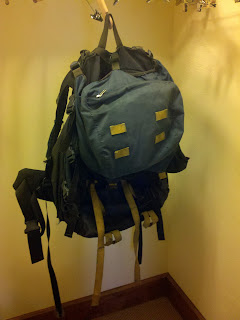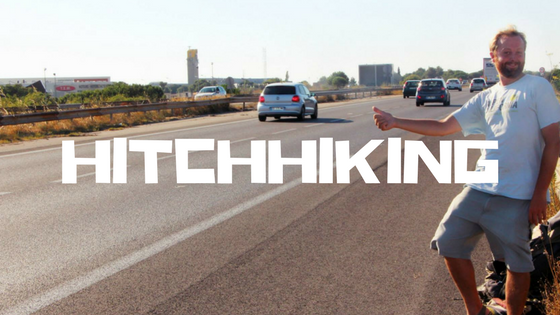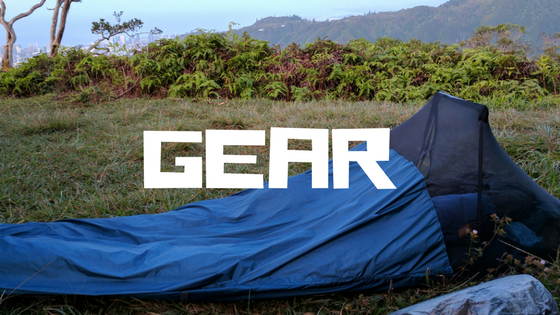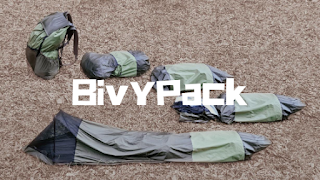I'm Hanging Up My Backpack For Good
After half a decade of hauling around North America and a trip around the globe, I'm finally hanging up my backpack. There's been many borders crossed and miles hiked, time spent cramped in buses, planes, trains and more trucks and cars then I'm willing to count. Tested by the elements and knocked around by time, it's been a hell of a ride and amazing that it's lasted this long.
I'm only talking about my backpack of course, there'll be no slowing down for me just yet. In fact, this is the sign of much more to come.
As I retire my backpack that has served me so well, I welcome in a new one for the adventures to come. It's lighter, has less capacity (to discourage ever having more than I need) and is even more comfortable.
The original backpack was some version made by North Face given to me by my aunt in Jackson, Wyoming. She'd had it for a while using it for camping trips and at least one big trip out to Turkey before passing it on to me to start my travels.
I loved it, still do. It always had plenty of room, extending up and up, probably too much as I used to carry way too much stuff. Over the years we became almost one; I sometimes felt off balance and strange walking without it. I had my system of what lived in what pockets, how I took it on and off and how best to lay it on the ground for easy access or stand it straight up beside me while thumbing the next ride. Old friends and their roommates would recognize it immediately sitting in their living room and knew I was in town.
Time did it's trick though, no bag is indestructible. It got dirty of course, some of the worst being on a couple Greyhound bus rides where oil spilled all over it, but dirt and grime is not too big a problem. The shoulder straps were the first noticeable part of the real wear and tear, the padding began protruding and eventually each solder strap was only hanging by threads, I'm still amazed that they never fully broke off. A friend in New Orleans eventually sewed some additional fabric around them to help a bit.
Less than two years ago while hiking in New Zealand the first major hole began to form alongside one of the zippers, I attempted to sew it up, but things got worse. Then another rip began forming in another pocket. I began adjusting my packing style so nothing smaller than the holes went in the respective pockets. Shortly later a main zipper broke, I "fixed" it, but it liked to fall off every now and again which required immediate "fixing" each time.
A few times I was parted from my backpack temporarily, unsure if I'd ever see it again. On one occasion recently, when it was finally returned, it was all kinds of damaged, there was no explanation from the drunken night that I'd lost it. The metal frame was slightly bent, a shoulder strap connection was ripped off and more tears had appeared. All at the same time a seven gallon bucket of liquid malt extract (carmel like substance used for brewing beer) had erupted inside, cleaning this thick glue like stickiness out was quite the chore.
Finally in just the past month the frame began poking through the bottom of the pack, the end was near.
Although I like to think I could have trucked on and got some more miles out of it, inevitably I would have to get a new pack. So, in the spirit of having just gotten some new gear in the form of free shoes sent from KEEN (they liked my story of where my previous shoes had traveled), I took the opportunity to upgrade with the help from my sympathetic mother, one who's wishing I'd stop traveling one one hand, and encouragingly proud of me on the other.
I was amazed when I started researching the newer backpacks available (as well as sleeping bags) at how light things have become. The bag I finally settled on, Osprey Exos 58 Internal Frame Pack (Google Affiliate Ad), weighs just over two and a half pounds (just under 1.2 kilos) versus my beloved original pack which was right around six pounds (around 2.75 kilos).
The reason for the reduced weight is mainly because of over a decade worth of improvements in technology (I have no idea what model my North Face was and therefore couldn't find any info online), but also in that it's capacity is a bit less, it's a slightly smaller bag. This was part of the motivation for upgrading my sleeping bag as well, as the smaller bag left me less room for the bulky one of I've always had.
The new sleeping bag is made by the people at GoLite, it's less than half the weight of my original with about the same warmth and compressing to a far smaller packing volume. It's 1lb 14 ounces (about .85 kilo) versus my original which was about 4lbs 4oz (about 2 kios).
So in the end I've shaved off almost six pounds of shoulder stressing weight, along with the issues of busted pockets, finicky zippers and a poky twisted metal frame. Not only that, but the new reduction in weight encouraged me to reassess the contents of my pack and I was inspired to ditch a couple more odds and ends here and there, which I'm sure will continue with the more simplistic and slightly more space limited pack.
In making this change I also realized something, I now am carrying nothing that I started with (except one sentimental coin-sized token). All my shirts, other clothes, laptop, odds, ends and now backpack and sleeping bag are all changed. Over the years everything else has either been ditched, traded, stashed, given away, replaced, lost or otherwise. Good times, it seems, is the only constant I have in all of this. Let's keep that going.
Geeky statistics
Total weight of stuff: 27.5 Pounds
(Including the backpack and everything in it, shoes and clothes I'm wearing and everything in my pockets. Not including food and water)
Base carry weight: 23.25 Pounds
(subtracting summer clothes worn, shoes and stuff in pockets)
The heaviest stuff:
Just clothes + Shoes: 10 Pounds (36% of total weight)
Backpack + rain cover + sleeping bag + stuff sack + bivy sack/mosquito net: 8 Pounds (29%)
Laptop + case + current book + cords + notebook: 5 Pounds (18%)
Room for future improvement:
My clothes account for more than a third of my total weight. I suppose I could get rid of a shirt and eventually get lighter weight shirts and lighter long underwear. I'm not too worried about all that at the moment though. Instead of jeans I could have lightweight hiking pants which would pack tighter and dry quicker. But I like jeans.
My bivy sack and mosquito net come in right around 3 pounds. Newer ones are between 1 and 2 pounds even including a lightweight tent pole at the head providing some more breathing room, they also pack smaller.
If I didn't do a fair amount of writing and coding I could ditch the laptop, relying solely on my android saving over three or four pounds. Oh well.
It's easy to see how light someone could travel while still being plenty comfortable. Based on my gear, someone could make the improvements above, ditch the laptop, the jeans and more (even get a lighter backpack given the reductions) and have their carry weight down below 15 pounds, while still being able to camp anywhere, stay clean, warm and dry.
If you google "ultralight backpacking" you'll see plenty of tips. While most of this is targeted towards hikers, it can still be applied to the permanent traveling lifestyle where one carries everything they own for all climates, terrain and cities alike.
It's fun to geek out on this stuff, but in the end it doesn't matter so much how light or heavy the pack is, but where you go with it and the adventure getting there.
I'm only talking about my backpack of course, there'll be no slowing down for me just yet. In fact, this is the sign of much more to come.
As I retire my backpack that has served me so well, I welcome in a new one for the adventures to come. It's lighter, has less capacity (to discourage ever having more than I need) and is even more comfortable.
The original backpack was some version made by North Face given to me by my aunt in Jackson, Wyoming. She'd had it for a while using it for camping trips and at least one big trip out to Turkey before passing it on to me to start my travels.
I loved it, still do. It always had plenty of room, extending up and up, probably too much as I used to carry way too much stuff. Over the years we became almost one; I sometimes felt off balance and strange walking without it. I had my system of what lived in what pockets, how I took it on and off and how best to lay it on the ground for easy access or stand it straight up beside me while thumbing the next ride. Old friends and their roommates would recognize it immediately sitting in their living room and knew I was in town.
Time did it's trick though, no bag is indestructible. It got dirty of course, some of the worst being on a couple Greyhound bus rides where oil spilled all over it, but dirt and grime is not too big a problem. The shoulder straps were the first noticeable part of the real wear and tear, the padding began protruding and eventually each solder strap was only hanging by threads, I'm still amazed that they never fully broke off. A friend in New Orleans eventually sewed some additional fabric around them to help a bit.
Less than two years ago while hiking in New Zealand the first major hole began to form alongside one of the zippers, I attempted to sew it up, but things got worse. Then another rip began forming in another pocket. I began adjusting my packing style so nothing smaller than the holes went in the respective pockets. Shortly later a main zipper broke, I "fixed" it, but it liked to fall off every now and again which required immediate "fixing" each time.
A few times I was parted from my backpack temporarily, unsure if I'd ever see it again. On one occasion recently, when it was finally returned, it was all kinds of damaged, there was no explanation from the drunken night that I'd lost it. The metal frame was slightly bent, a shoulder strap connection was ripped off and more tears had appeared. All at the same time a seven gallon bucket of liquid malt extract (carmel like substance used for brewing beer) had erupted inside, cleaning this thick glue like stickiness out was quite the chore.
Finally in just the past month the frame began poking through the bottom of the pack, the end was near.
Although I like to think I could have trucked on and got some more miles out of it, inevitably I would have to get a new pack. So, in the spirit of having just gotten some new gear in the form of free shoes sent from KEEN (they liked my story of where my previous shoes had traveled), I took the opportunity to upgrade with the help from my sympathetic mother, one who's wishing I'd stop traveling one one hand, and encouragingly proud of me on the other.
I was amazed when I started researching the newer backpacks available (as well as sleeping bags) at how light things have become. The bag I finally settled on, Osprey Exos 58 Internal Frame Pack (Google Affiliate Ad), weighs just over two and a half pounds (just under 1.2 kilos) versus my beloved original pack which was right around six pounds (around 2.75 kilos).
The reason for the reduced weight is mainly because of over a decade worth of improvements in technology (I have no idea what model my North Face was and therefore couldn't find any info online), but also in that it's capacity is a bit less, it's a slightly smaller bag. This was part of the motivation for upgrading my sleeping bag as well, as the smaller bag left me less room for the bulky one of I've always had.
The new sleeping bag is made by the people at GoLite, it's less than half the weight of my original with about the same warmth and compressing to a far smaller packing volume. It's 1lb 14 ounces (about .85 kilo) versus my original which was about 4lbs 4oz (about 2 kios).
So in the end I've shaved off almost six pounds of shoulder stressing weight, along with the issues of busted pockets, finicky zippers and a poky twisted metal frame. Not only that, but the new reduction in weight encouraged me to reassess the contents of my pack and I was inspired to ditch a couple more odds and ends here and there, which I'm sure will continue with the more simplistic and slightly more space limited pack.
In making this change I also realized something, I now am carrying nothing that I started with (except one sentimental coin-sized token). All my shirts, other clothes, laptop, odds, ends and now backpack and sleeping bag are all changed. Over the years everything else has either been ditched, traded, stashed, given away, replaced, lost or otherwise. Good times, it seems, is the only constant I have in all of this. Let's keep that going.
Geeky statistics
Total weight of stuff: 27.5 Pounds
(Including the backpack and everything in it, shoes and clothes I'm wearing and everything in my pockets. Not including food and water)
Base carry weight: 23.25 Pounds
(subtracting summer clothes worn, shoes and stuff in pockets)
The heaviest stuff:
Just clothes + Shoes: 10 Pounds (36% of total weight)
Backpack + rain cover + sleeping bag + stuff sack + bivy sack/mosquito net: 8 Pounds (29%)
Laptop + case + current book + cords + notebook: 5 Pounds (18%)
 |
| Sleeping bags: Old vs New |
My clothes account for more than a third of my total weight. I suppose I could get rid of a shirt and eventually get lighter weight shirts and lighter long underwear. I'm not too worried about all that at the moment though. Instead of jeans I could have lightweight hiking pants which would pack tighter and dry quicker. But I like jeans.
My bivy sack and mosquito net come in right around 3 pounds. Newer ones are between 1 and 2 pounds even including a lightweight tent pole at the head providing some more breathing room, they also pack smaller.
If I didn't do a fair amount of writing and coding I could ditch the laptop, relying solely on my android saving over three or four pounds. Oh well.
It's easy to see how light someone could travel while still being plenty comfortable. Based on my gear, someone could make the improvements above, ditch the laptop, the jeans and more (even get a lighter backpack given the reductions) and have their carry weight down below 15 pounds, while still being able to camp anywhere, stay clean, warm and dry.
If you google "ultralight backpacking" you'll see plenty of tips. While most of this is targeted towards hikers, it can still be applied to the permanent traveling lifestyle where one carries everything they own for all climates, terrain and cities alike.
It's fun to geek out on this stuff, but in the end it doesn't matter so much how light or heavy the pack is, but where you go with it and the adventure getting there.


















